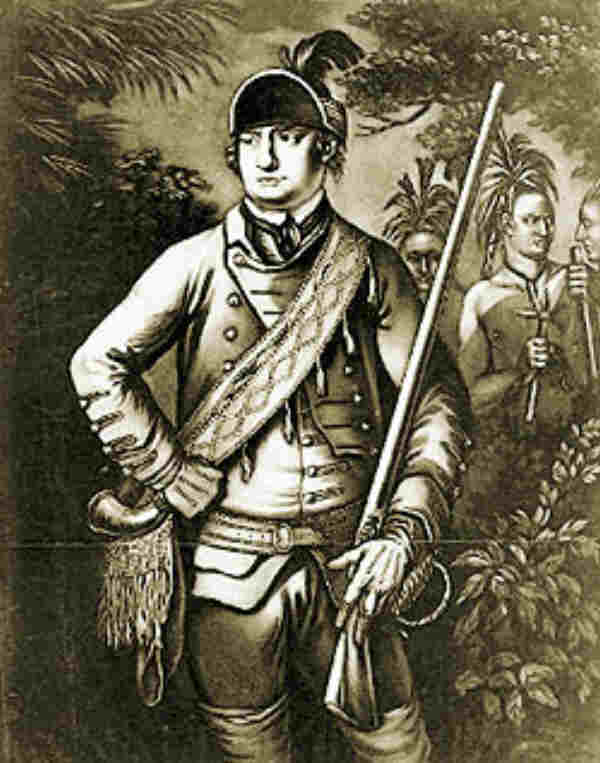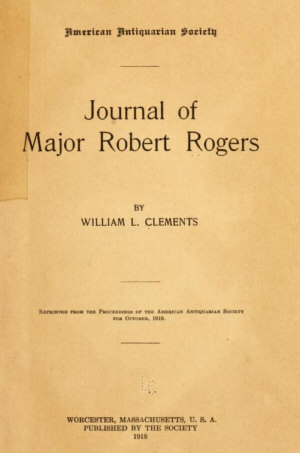 Major Robert Rogers
Major Robert Rogers
Legendary Bay City Book Collector William L. Clements Also Was an Author
He Tussled with Ancestor of Major Robert Rogers for Rights to Edit Journal
November 20, 2010
By: Dave Rogers
 Cover of Journal of Major Robert Rogers edited by William L. Clements.
Cover of Journal of Major Robert Rogers edited by William L. Clements.
William L. Clements, a towering figure in Bay City and the early American book collecting world, produced a uniquely valuable document in Michigan history.
But not without trial and tribulation.
In 1918, Clements put down his checkbook for once, and picked up a pen to edit the "Journal of Major Robert Rogers," British commander at Fort Michilimackinac during the French and Indian War.
As World War I was coming to an end, and the influenza epidemic of 1918 was claiming thousands of lives -- including that of James Renville Clements, son of William L. Clements -- the book collector became author.
The accomplishment was preceded by controversy, as Clements was challenged by the great-great granddaughter of Rogers, Miss Mary Cochrane Rogers, of Boston.
Details of the clash are found in an obscure book, "Shaping a Library: William L. Clements As Collector," by Margaret Maxwell. It was an adaptation of her doctoral dissertation at the University of Michigan published in the Netherlands by Nico Israel in 1973.
Clements had discovered Rogers' Journal in the American Antiquarian Society in Boston and had convinced the society's director, Clarence Brigham, to make a photostatic copy so he could edit and publish the manuscript.
The historic work documented Major Rogers experiences from Sept. 21, 1766 until July 3, 1767 at the fort on the mainland near Mackinac Island.
Miss Rogers objected when she heard Clements had obtained the photostatic copy, huffing: "I wish to be the first to bring out my great, great grandfathers' unpublished journal. I have worked a long time on my book and my grandfather who was the family oracle gave me much material."
Clements, not one to be easily deterred, especially by a woman, wrote to Brigham about the "rather belligerent letter," commenting "if I knew you better I would be inclined to believe that her letter was directed to me by you as a practical joke."
Clements did not spare the lady the knife, commenting "I might add, too, that Rogers' great, great granddaughter has inherited, I am sure, the tragical characteristics of Rogers, if I can judge."
Brigham reported that Miss Rogers descended on the society headquarters and "riled all of my assistants with misstatements and faultfinding," likening them to "some of the worst characteristics of her noted ancestor."
Although Clements was able to write an introduction and prepare the manuscript, when it came time to read the paper in Boston, the flu epidemic that killed his son had erupted and the University of Michigan was shut down with dozens of deaths, so he had to have a surrogate present the work to the eminent historians.
The interruption caused Clements to miss attending the reading of his work on Rogers at the antiquarian society and a meeting of the prestigious Club of Odd Volumes to which he had been invited. Miss Rogers showed up at the reading but was turned away by Brigham, who told her "she would have to read the Journal in print."
She self-published "A Battle Fought on Showshoes" in 1917, detailing some of the exploits of her ancestor, but apparently did not get her hands on the coveted Journals.
The Journal edited by Clements revealed some details of Indian activities in this area, mentioning that furs and pelts exported from Michilimackinac in the summer of 1767 included three canoe loads from Saguinay Bay and three from Machidash (presumably the Manistee River) and Riviere au Sable.
Maj. Rogers had advanced funds, and contracted debts, to furnish gifts to the Indians during the convocation of June 24-July 3, 1767. He apparently saw good relations between the Indians and the English as a wedge against French incursions.
The journal outlines the clash between Rogers and Irish-born commander Sir William Johnson, the British Indian Commissioner, who invariably disallowed Rogers' claims for payment stating they were "unnecessary and not contracted with his authority."
One example of Rogers' initiatives was documented as follows: "Sent M. Cardin, a Frenchwoman, to Abacroach (L'Arbre Croche, today's Cross Village) to find out what the Indians were about, as I hear'd that a number of them had assembled and there were bad intentions amongst them. I gave her three gallons of rum to talk privately with them and find out their designs."
The disputes with Johnson ended with Rogers being taken in chains to Montreal for trial. Although he was acquitted of wrongdoing, his reputation was tarnished and he died penniless, broken and desolate in England in 1796.
You can read Rogers' Michilimackinac journal online at http://www.archive.org/stream/journalofmajorro00roge#page/n1/mode/2up.

